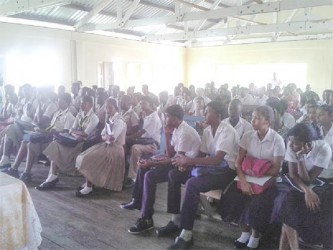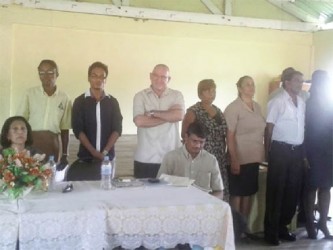Religious leaders in Region 6 recently moved to stem the tide of persons taking their own lives in the region through an initiative that saw young people talking with their peers, parents, social workers and the religious leaders themselves.
The ‘Let’s Talk’ meeting was recently hosted by Humanitarian Mission of Jersey Arya Samaj Mandir Inc, in collaboration with the Ministry of Human Services and Social Security, the Ministry of Health, the Education Department of Region 6, religious organisations and stakeholders under the theme ‘Suicide Prevention and Spirituality.’ Berbice is said to be the suicide capital of Guyana and for the year so far there have been nine suicides and 77 attempted suicides.
The event saw students from across the Corentyne district gathered at the Corentyne Comprehensive High School. They were educated on what should be done in cases of suicidal thoughts. There was a period for interaction, but few participants made use of the opportunity. However, Pandit Suresh Sugrim head of the humanitarian group told teenagers that was an opportunity to see the faces of social workers and religious leaders in the Corentyne area. He told the students that if at any time they needed to speak on issues that would impact their lives they could contact anyone of the persons present.

Meanwhile, religious leaders told the students that a possible way to end suicide is by having a sound spiritual life. They pointed out that religion condemns the act of taking one’s life.
Additionally, the leaders, especially Pandit Kamal Danhesar, called on the Ministry of Education and communities to set up anti-suicide groups in the schools and the community. He explained with such groups, affected persons can access counselling and guidance along with emotional and physical support. “If we can work together we would be a great force to fight this human disaster,” Danhesar said.
First Lady Deolatchmee Ramotar addressed the gathering and pointed to the need to return to the days where communities helped to raise the children. She added that religious organisations need to do more to help because they have a very significant role in the communities. She suggested that they interact with the youths and adults of the communities.
She also called on parents to have understanding and confidential relationships with their children. “We have to encourage the habit and culture of talking to each other as members as a family. We have to have that relationship that we can talk about any issue,” she urged.

Ramotar noted that often misunderstandings resulted from disagreements between parents and children with regard to “romantic relationships,” which on numerous occasions resulted in the child committing suicide. The First Lady pointed out that while parents should advise their children, at the same time they should accept their choices.
She shared alarming statistics on suicide. She related that according to the World Health Organisa-tion, globally one million people take their own lives each year. She also stated that in Guyana the majority of suicide victims are Indo-Guyanese and most take their lives by ingesting pesticide.
Surinamese Ambassador to Guyana Nisha Kurban-Baboe, who was also present, called for a collaborative effort to fight suicide in the neighbouring countries, while noting that her homeland also has an alarming rate of suicide.
Kurban-Baboe said there should be a rigid system with regard to accessing pesticides. She noted that with such a system access would be minimised and restricted to farmers.
Minister of Human Services and Social Security Jennifer Webster emphasised to the teens gathered that life is precious. She urged that if they noticed the “symptoms of suicide in a peer [they] should be a brother or sister to the victim.” The youths were urged to speak out and seek help for persons who are considering suicide.
Webster also called for more sensitisation programmes on suicide and other social issues in schools and the region.
Dr Bhiro Harry spoke on behalf of the Ministry of Health.





